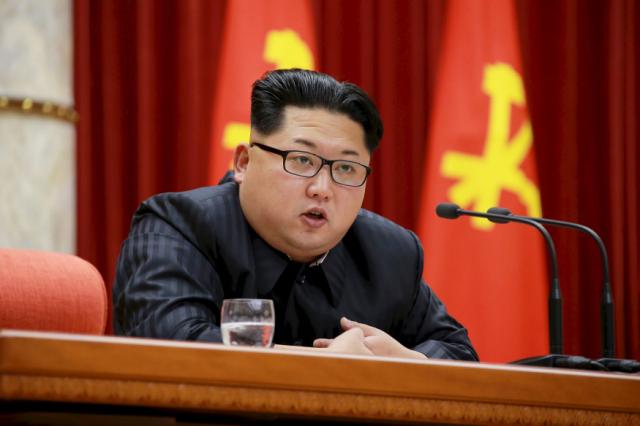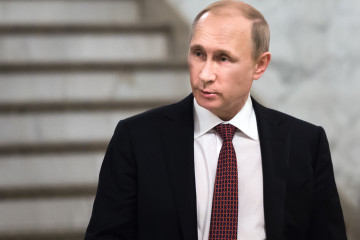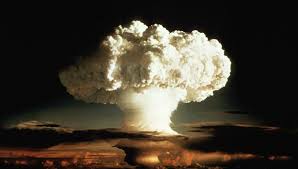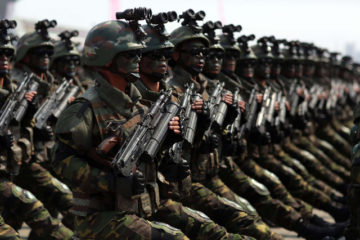`Time Warp’ North Korea Must Send Sign for Change, Seoul Says

(Bloomberg) —North Korea, a country in a “time warp” that feeds paranoia at home with propaganda about a hostile world, could secure its future by laying the groundwork for talks on its nuclear weapons program, according to South Korea’s foreign minister.
While Kang Kyung-wha welcomed a two month hiatus in North Korean provocations after a rapid-fire series of missile tests from the middle of this year, she said the isolated state needs to do more to defuse tensions that have escalated not only between Seoul and Pyongyang but between the regime and the U.S. under the presidency of Donald Trump.
“We very much hope there will come a point when we have North Korea at the table discussing denuclearization,” Kang said on Saturday in an interview on the sidelines of the Asia-Pacific Economic Cooperation summit in Danang, Vietnam. “But before we can do that they need to continue to not provoke and we have seen that for the past two months,” she said. “We need a clear sign of a change of course from North Korea.”
Kang, 62, added that South Korean officials are discussing what that sign would be among themselves and with U.S. counterparts.
In her role since June, Kang couched talks as being very much in North Korea’s own interest. The country is impoverished as leader Kim Jong Un pushes ahead with a massive weapons program designed to give him the ability to hit the U.S. mainland with a nuclear warhead.
“It is a country caught up in its own time warp if I could put it that way, a very insular closed society that does not understand what is going on in the outside world,” she said. “And it constantly feeds this propaganda of a hostile world out there that they need to protect themselves from and this gives them strength, which is completely misguided.”
“Missiles and nuclear capability will not secure their future,” Kang said. “Their future will be better secured when they see they need to join the rest of the world.”
Her comments echoed Secretary of State Rex Tillerson, who said Friday he can envision the U.S. and North Korea agreeing to hold talks at some point as a precursor to formal negotiations. The U.S.’s top diplomat said he’d look for a “relative period of quiet and an indication from Kim Jong Un himself that they would like to have some type of a meeting.”
Trump, who has called Kim “little rocket man” and threatened to annihilate North Korea — he wrote on Twitter on Sunday “why would Kim Jong-un insult me by calling me ‘old,’ when I would NEVER call him ‘short and fat’?’’ — also said on Sunday he could see himself becoming friends with Kim.
‘Very Nice’
“Certainly, it is something that could happen,” Trump said in Hanoi, Vietnam. “I don’t know that it will, but it would be very, very nice if it did.”
North Korea’s last provocation was on Sept. 15, when the isolated state fired its second missile over Japan in as many months — a rocket that flew far enough to put the U.S. territory of Guam in range. It has repeatedly threatened to fire a missile near the American territory in the Pacific.
Kang, the country’s first female foreign minister and a former special adviser to United Nations Secretary-General Antonio Guterres, said the western world was not out to destroy North Korea. “We have repeatedly said that we do not hold the hostile policy, we don’t seek to change regime, we don’t seek to march beyond the DMZ,” she said. “All we seek really is peace.”
South Korea under President Moon Jae-in has differed from the U.S. in approach to the North Korea question. While Trump has threatened military action against Pyongyang if it continues its march toward the ability to strike the U.S., Moon has called for both sanctions and a push for talks.
Kang’s comments come as South Korea joins the U.S. in drills near the Korean peninsula.
The U.S. Navy on Saturday started exercises in the Western Pacific using three aircraft carriers — the first such exercise in a decade. North Korea routinely complains about such drills and says they are a prelude to an attack.
While the U.S. and South Korea include Japan in missile-warning and anti-submarine drills, Kang said any further military collaboration with Tokyo would be a very sensitive issue. Cooperation between the neighbors is regularly hindered by historical grievances stemming from Japan’s colonial occupation of the Korean peninsula from 1910 to 1945.
A state banquet in Seoul for Trump last week featured shrimp caught in waters near islands claimed by both Japan and South Korea. And one attendee was a woman forced to work as a sex slave for the Japanese military during World War II. Japan’s foreign ministry made a formal complaint to South Korea.
‘Many Tracks’
“Trilateral collaboration with Japan and the United States is very important,” Kang said. “We need to move on so many tracks with Japan but also finding a way to deal with the issues of the past, not to paper over them, but to deal with those issues as genuine issues with the collective wisdom of the two sides and the leaders on both sides.”
Defense Minister Song Young-moo told lawmakers in July that South Korea is “ready to review” the possibility of building its own nuclear-powered submarine. Kang said nuclear submarines were part of the discussion about beefing up the military.
“Because of North Korea’s nuclear and missiles threat and growing threat, we need to be sure we have a robust military preparedness for whatever contingency might arise,” she said. “We need to constantly upgrade and update our military capabilities.”
Kang said President Moon’s trip to Southeast Asia was part of his push to enlist the region to nudge North Korea to the table. He is also seeking closer economic ties with the 10-member Association of Southeast Asian Nations.
“Asean in particular, the soil is already so rich, millions of South Koreans visit this region, we have half a million Asean nationalities working and having married into Korea,” she said. “The president wants to build upon that to really build our relations with Asean.”







No Comment